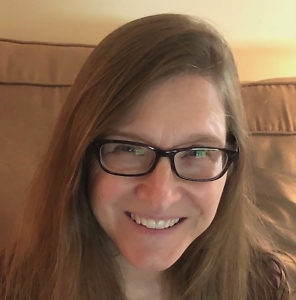Stories Connect Us
Caitlin Hamilton Summie’s first novel explores the heart of a proud Midwestern family
“It is important to know how one’s story begins, especially in our family,” explains Sarah Macmillan to her daughter in Geographies of the Heart, the first novel by Knoxville writer Caitlin Hamilton Summie. “Stories connect us; words are our banners and flags. We have no crest. We have the twining of our chapters.”

Summie brings the Macmillan clan to life in twining chapters of her own — each a standalone story contributing to the portrait of this close-knit Minneapolis family. The chapters are narrated by different family members in roughly chronological order over 25 years, but Sarah is the emotional center of the novel.
Sarah’s story opens in 1994 with Al, her future husband, who is welcomed into the family from the beginning: “It was like water, his arrival, a smooth transition,” Sarah observes of their first Thanksgiving together. “Add a boulder to the stream and the stream works around it. No upsets, no tension, just the rearrangement that comes with multiplying.” Al is a big man physically, a steady soul, and a professor of religion at the local university, where they meet when Sarah is about to graduate. He has “the heart of a puppy in the body of a bear,” Sarah says. He is used to providing support to others. But after a series of very personal losses later in life, Al struggles to bounce back: “He wondered why he couldn’t quite escape the sharp grip of grief. It was always there, a thin sliver of cold; a splinter. Something hair thin, like a small crack, something pointed that caught in him and created a widespread ache. Sometimes, Al had to stop and catch his breath.”
Sarah’s only sibling is her sister Glennie, whose emotional distance and unexplained absences from the family — often in times of need — are a source of great bitterness to Sarah, who is always ready to spring into action on behalf of her loved ones and often called upon to do so. Glennie is beautiful and brilliant, focused with single-minded determination on becoming a doctor, while Sarah never reaches her own career goals, becoming instead a seamstress and a stay-at-home mother. When Sarah is unable to reach Glennie yet again as their grandfather nears death, she snaps: “When I turned back to the elevators alone, I turned like others in my family had turned before me, some like milk, others like fall leaves, a little more sour, or ready to crumble at the touch. I turned and something twisted in me when I did.”
 Sarah’s beloved grandparents and their decline drive a large portion of the novel. When they are forced to move from the family home to a nursing home, Sarah redoubles her efforts to record their part of the family history before it’s too late. It’s a project that brings them into conflict when Sarah tries to tell the whole truth, especially about her grandmother’s wayward sister. Her grandmother finally acquiesces but demands, “‘You tell them yourself. Tell them all. But do us justice, or I’ll haunt you.’ Then my grandmother laughed. She turned [her walker] and aimed for the lobby. Then she stopped, turned one last time and said, ‘I could do it, you know,’ but she smiled when she spoke, and as I watched her go, I nodded, having no doubt that she would haunt me all my life.”
Sarah’s beloved grandparents and their decline drive a large portion of the novel. When they are forced to move from the family home to a nursing home, Sarah redoubles her efforts to record their part of the family history before it’s too late. It’s a project that brings them into conflict when Sarah tries to tell the whole truth, especially about her grandmother’s wayward sister. Her grandmother finally acquiesces but demands, “‘You tell them yourself. Tell them all. But do us justice, or I’ll haunt you.’ Then my grandmother laughed. She turned [her walker] and aimed for the lobby. Then she stopped, turned one last time and said, ‘I could do it, you know,’ but she smiled when she spoke, and as I watched her go, I nodded, having no doubt that she would haunt me all my life.”
It is likely that readers of this lovely novel will be haunted as well. It’s a book about love and family, surely, but even more so about loss — the loss of loved ones to death, the loss of relationships, the loss of one’s dreams. While Summie gives to all her characters a quiet dignity, a steady practicality of voice, and a grounding in their beloved if sometimes harsh Midwestern landscape, she also clearly depicts their sudden anger and devastating grief, good humor and fierce loyalty, strength of heart, and proud spirit as they walk through their own daily dramas and those of their family and community.
“It’s about where you came from, [Sarah] thought. It’s about what you know. And you either love that landscape you were born into or hate it and move elsewhere. But it never leaves you, that first geography. That early terrain becomes the rough view of your heart. That place, the weather, the amount of space. It enters your blood.”

Tina Chambers has worked as a technical editor at an engineering firm and as an editorial assistant at Peachtree Publishers, where she worked on books by Erskine Caldwell, Will Campbell, and Ferrol Sams, to name a few. She lives in Chattanooga.


